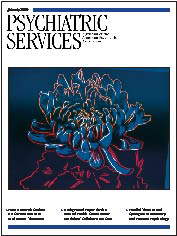Psychiatric Services in 2006 and in the Future
It is a privilege to edit Psychiatric Services and to work with our excellent staff to bring you the journal each month. It has taken some time to truly take over the reins from John Talbott, who made this journal an important publication during his 23 years as editor. However, I am now comfortable writing to our readers in this space. I am not "taking issue" with anything; I just want to briefly describe my vision of the journal's mission and to tell you about a few changes.
Psychiatric Services balances several interests. First, it is a professional communication about mental health services, including some papers on substance abuse services, developmental disabilities, and mental health services in general health care settings. Occasionally, we publish papers on clinical matters and on epidemiology, and even a few methods papers, but we focus primarily on mental health services.
We try to attend to the needs of our multidisciplinary readership, which includes psychiatrists and other clinicians, administrators, policy makers, researchers, and other stakeholders. Mostly we hope to be what we call a "journal of voice," sharing scholarly work on topics of interest. At other times we are also a "journal of record," documenting the results of important studies or providing commentary on critical issues. Virtually all submissions to the journal are peer reviewed—the exceptions are some letters to the editor and the book reviews. The research is vetted for scientific rigor; the commentaries and other submissions are reviewed for conceptual clarity and accuracy. Psychiatric Services emphasizes external validity along with internal validity. The generalizability and relevance of our papers to policy and practice are central to the mission and impact of the journal.
To realize this vision we rely on many individuals—editorial board members from the ranks of the American Psychiatric Association, peer reviewers, column and section editors, and a range of editorial consultants with diverse backgrounds. Their wisdom gives Psychiatric Services a better voice and makes it a more scientific record of mental health services, reflecting where services are today and where we want them to be in the future. Starting with this issue, we have reduced the number of standing columns to seven and have added some of the former column editors to the growing ranks of editorial consultants. Papers accepted as columns that address issues outside the scope of the seven standing columns will be published under a new umbrella column—Innovations—and guest edited by an editorial consultant or another expert in the topic area.
I wish all of our readers a happy and productive new year, and I hope to hear from you.



